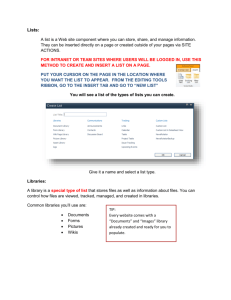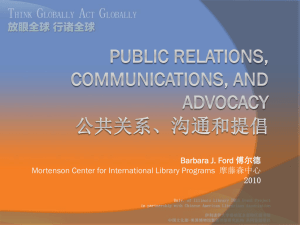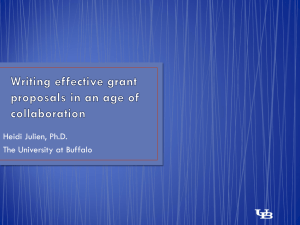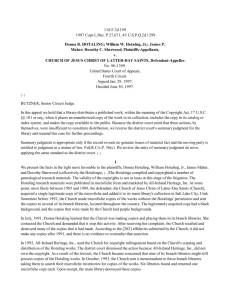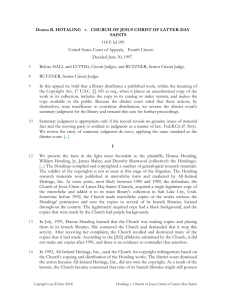571. H Rundle Full name: Hugh Rundle Proposal 4
advertisement
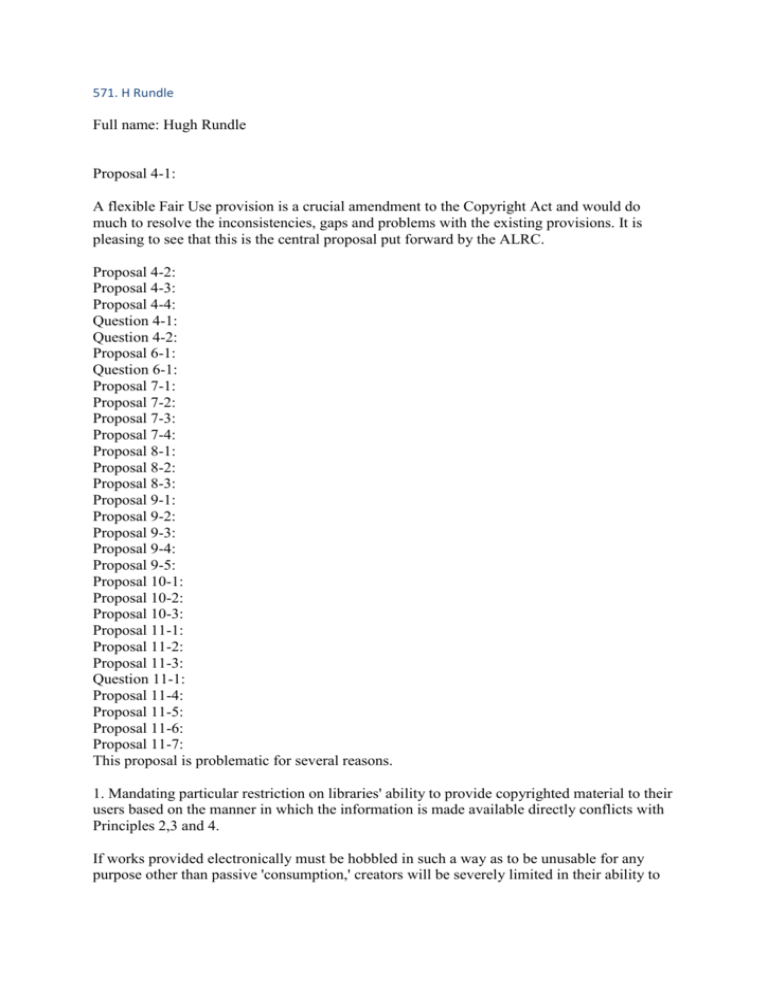
571. H Rundle Full name: Hugh Rundle Proposal 4-1: A flexible Fair Use provision is a crucial amendment to the Copyright Act and would do much to resolve the inconsistencies, gaps and problems with the existing provisions. It is pleasing to see that this is the central proposal put forward by the ALRC. Proposal 4-2: Proposal 4-3: Proposal 4-4: Question 4-1: Question 4-2: Proposal 6-1: Question 6-1: Proposal 7-1: Proposal 7-2: Proposal 7-3: Proposal 7-4: Proposal 8-1: Proposal 8-2: Proposal 8-3: Proposal 9-1: Proposal 9-2: Proposal 9-3: Proposal 9-4: Proposal 9-5: Proposal 10-1: Proposal 10-2: Proposal 10-3: Proposal 11-1: Proposal 11-2: Proposal 11-3: Question 11-1: Proposal 11-4: Proposal 11-5: Proposal 11-6: Proposal 11-7: This proposal is problematic for several reasons. 1. Mandating particular restriction on libraries' ability to provide copyrighted material to their users based on the manner in which the information is made available directly conflicts with Principles 2,3 and 4. If works provided electronically must be hobbled in such a way as to be unusable for any purpose other than passive 'consumption,' creators will be severely limited in their ability to utilised Australia's libraries for fair use of other copyrighted materials. This violates Principle 2. If libraries are restricted from making copyrighted materials available electronically for the purposes of study or research unless users are prevented from further communicating or altering the work, this contravenes Principle 3. In essence, what is being proposed is that if Australian library users are able to physically attend a library and access a copy of a work in physical format they should have privileged access to the works in comparison to a library user who is unable to physically attend or for whom a physical copy is unsuitable. Whilst it is (strangely) outside the scope of this review, a notable user group that would be disadvantage by such rules is sight-disabled people, however there are many other user groups who would be disadvantaged by such a system, including physically immobile or frail people, those living in remote areas, persons with reading or hearing difficulties and those who simply prefer to access material in an electronic format. Making a separate set of provisions based on the format of the work appears to be a step backwards into exactly the problems that the review was set up to fix. That is, it conflicts with Principle 4. The discussion paper itself states: "Uncertainty is created by definitions that become redundant or differentiate between subject matter or rights holders based on technology rather than underlying principle." It is not simply the Australian economy that has become increasingly digital - we are a digital society. Forcing libraries to provide neutered and inferior service to those legitimately accessing works through the library in electronic format rather than physical format is a strange anachronism of the sort this review should be eliminating. Under current law libraries can provide material electronically for research or study purposes legally without any of these restrictions. 2. The requirement to prevent users from communicating the work, altering the work or accessing it for an unlimited time if the work is provided in electronic format is largely unworkable or at the least costly and complex for libraries to administer. Depending on how 'take measures' is interpreted, such a requirement would be likely to impose enormous costs upon libraries for no discernible benefit. 3. In many cases it will not be possible for libraries to take such measures, either because of the particular format of the work, the capacity and funding of the library or the infrastructure available. This will result in library users being unable to access works that they are legally entitled to access under fair use provisions simply because the library that holds them is unable to meet the new onerous requirements. 4. The requirement to restrict use of works provided in electronic format assumes all users of material in electronic format are likely to breach copyright and treats librarians and their communities as pro-actively guilty of copyright infringement. This is a repugnant way to draft law. 5. Hobbling access to works in electronic format may render the particular study or research impossible to undertake if such research requires read-write access or format-shifting. If for example a work was needed in electronic format for a non-consumptive research use, such use would be legal under Proposal 8-1 but may be rendered impossible under Proposal 10-7 if the work in question was accessed via a public or academic library. Proposal 12-1: Proposal 12-2: Proposal 12-3: Proposal 13-1: Proposal 13-2: Proposal 13-3: Proposal 14-1: Proposal 14-2: Proposal 14-3: Proposal 15-1: Proposal 15-2: Question 15-1: Proposal 15-3: Question 15-2: Proposal 16-1: Question 16-1: Proposal 16-2: Question 16-2: Question 16-3: Proposal 17-1: The unconditional removal of the ability to contract out of library and archives and fair use and fair dealing exceptions are particularly important and pleasing to see included. Any weakening of these proposals would be hugely damaging to the entire reform, for the reasons I outlined in my submission to the Issues Paper. Additional comments?: With the exception of Proposal 11.7, the proposals put forward in the Discussion Paper appear to be reasonable, measured and, in many cases, well overdue. I therefore support all proposals listed, with the exception of Proposal 11.7 as noted. File 1: File 2:




